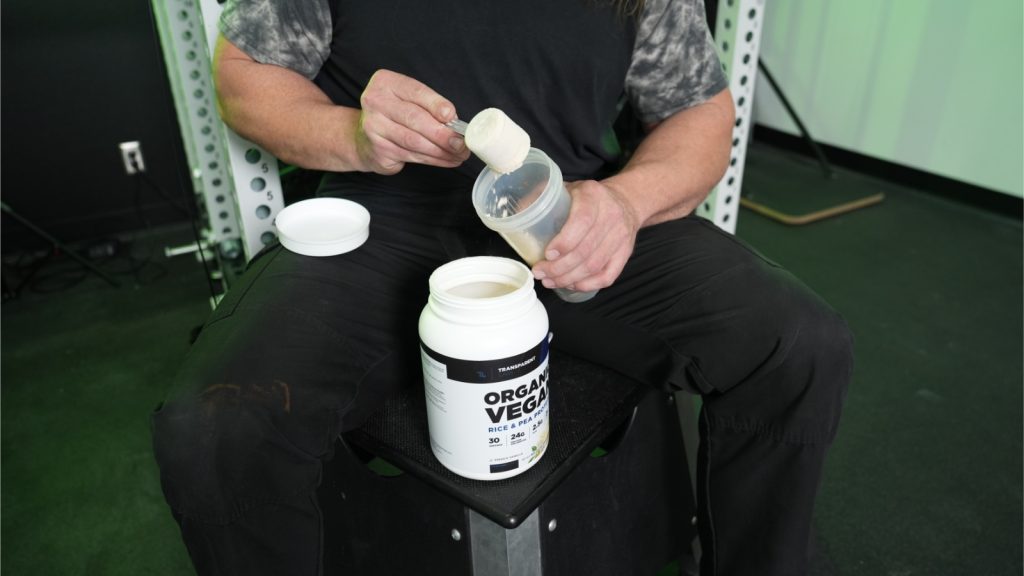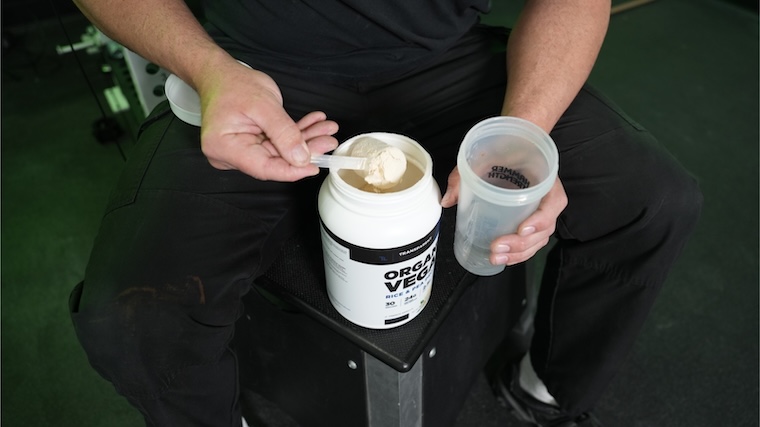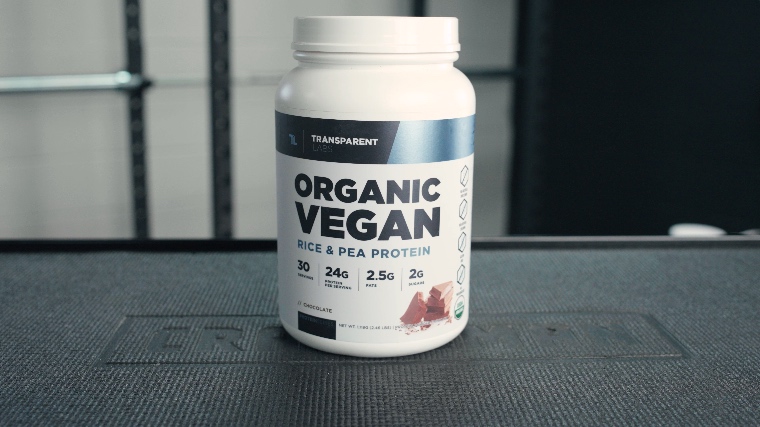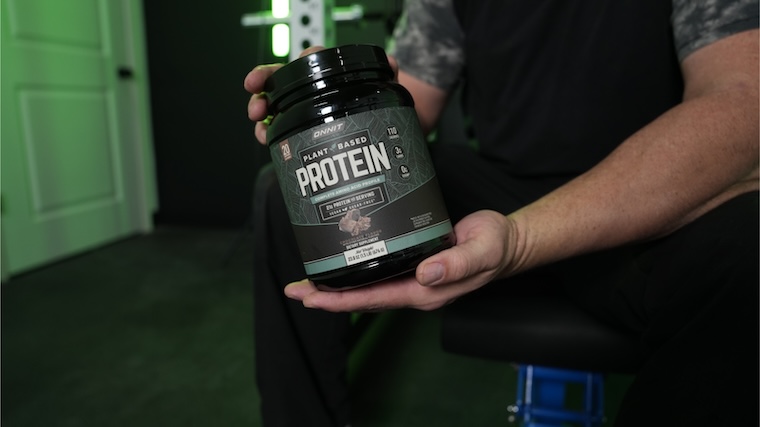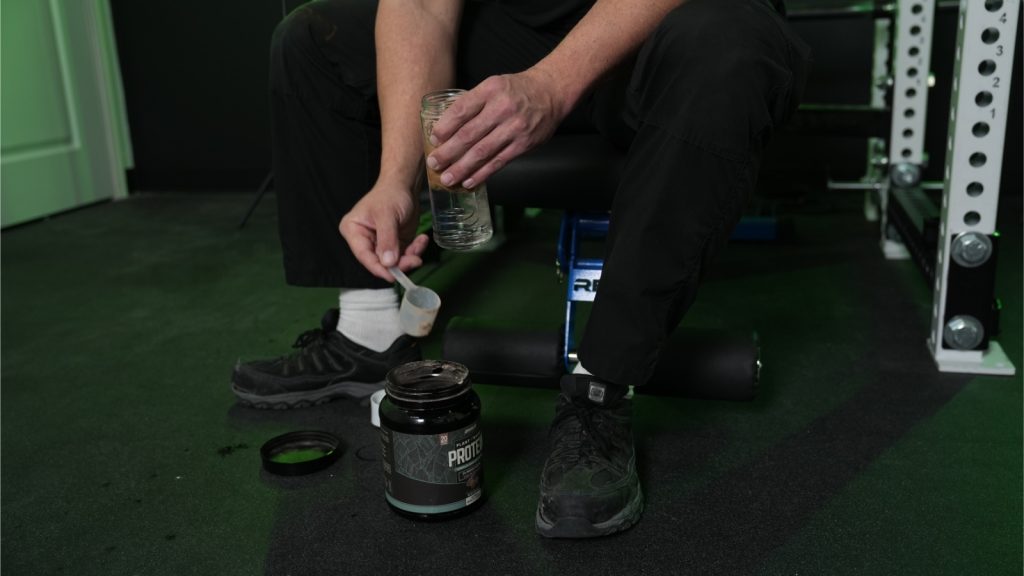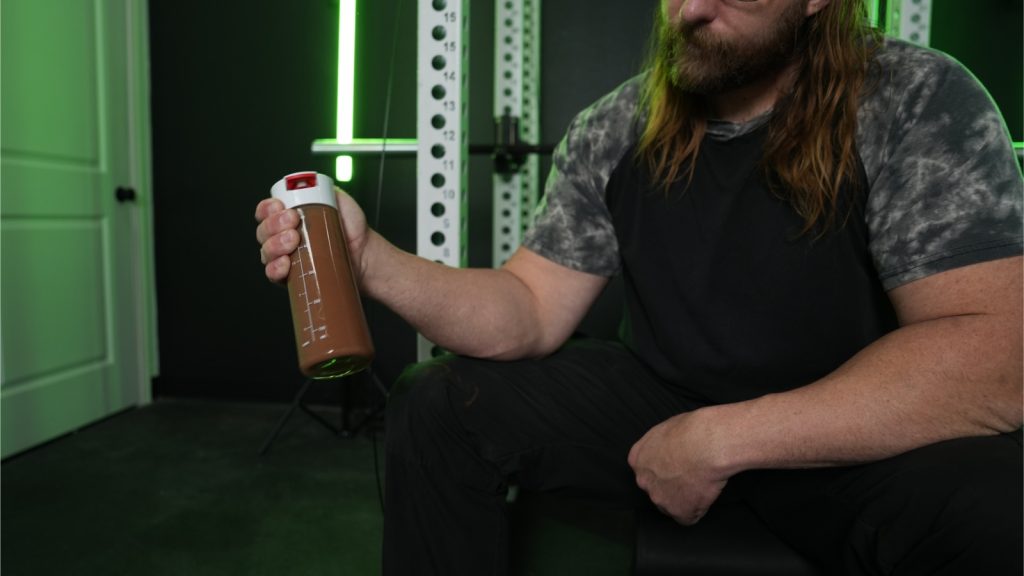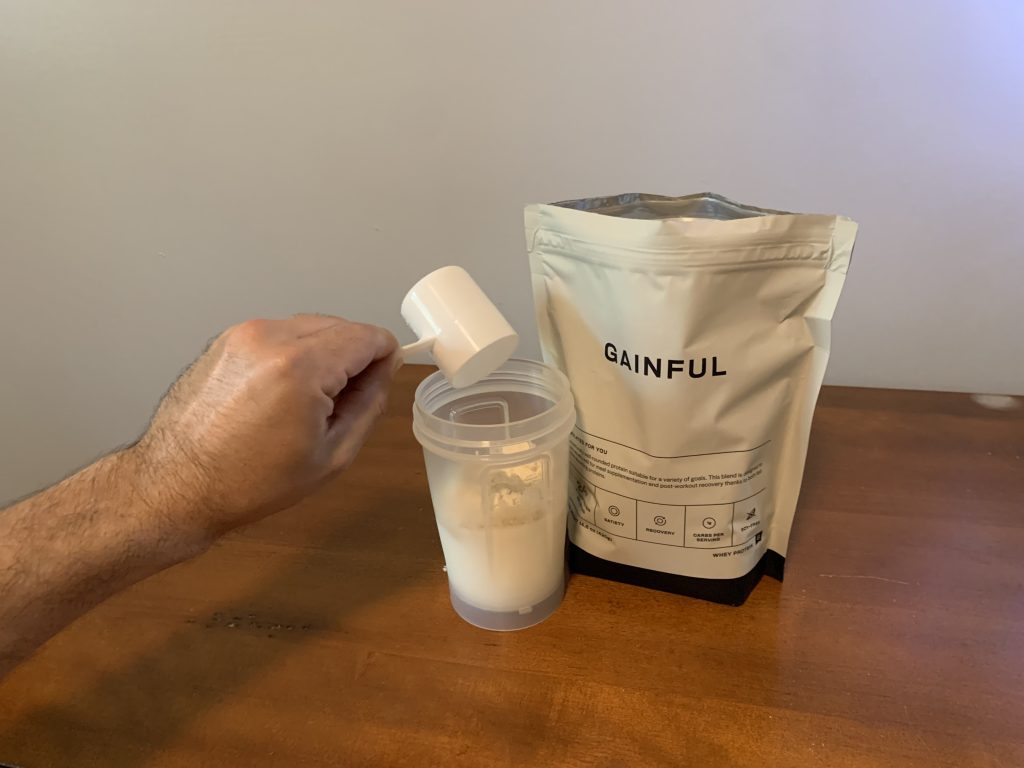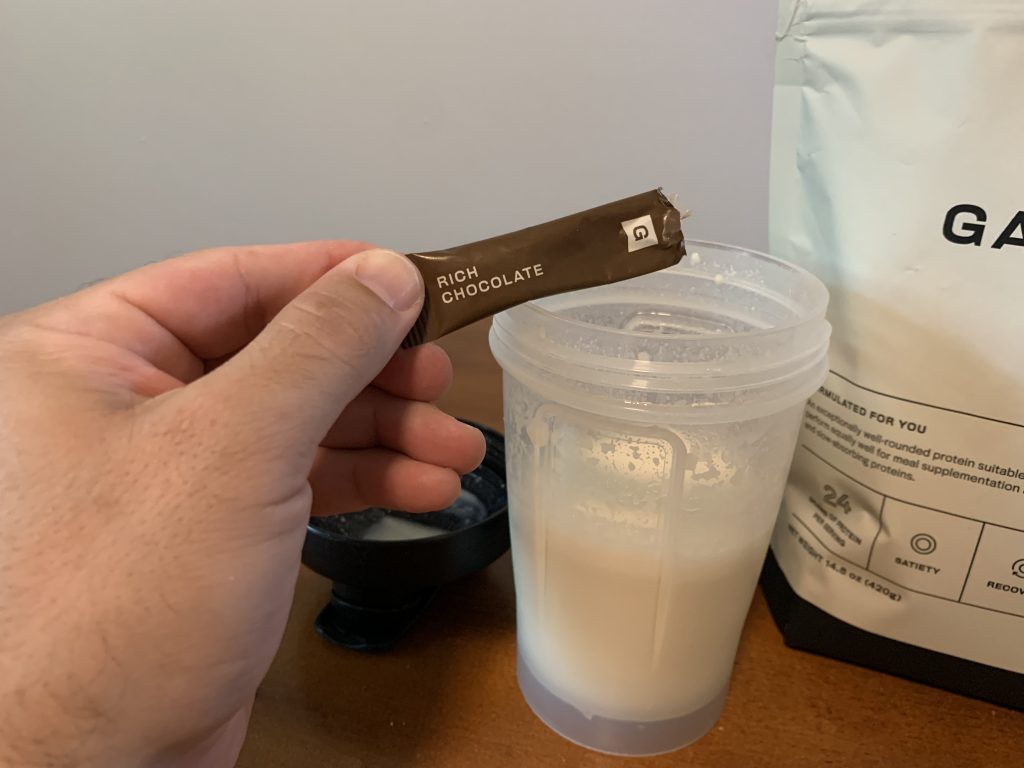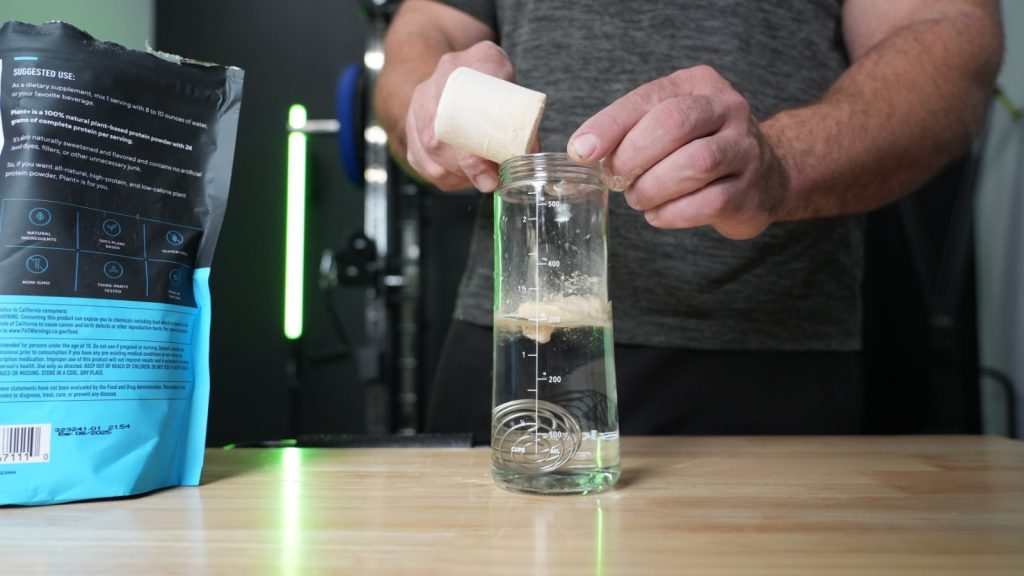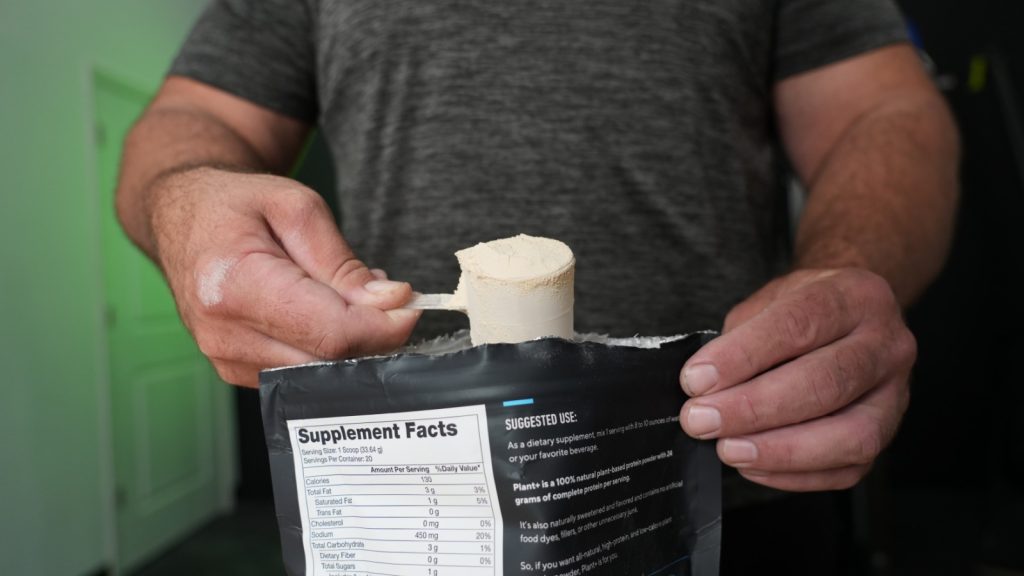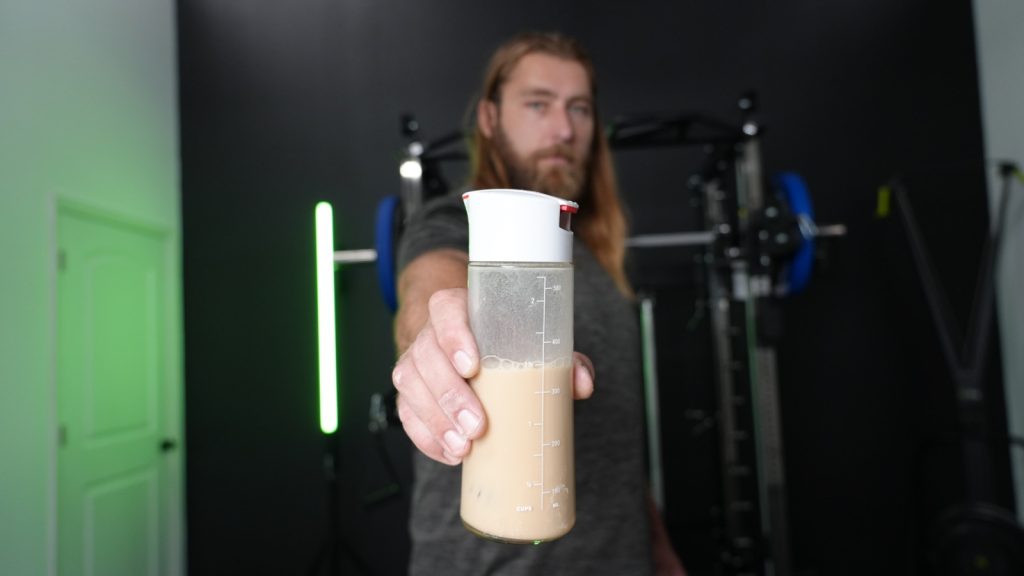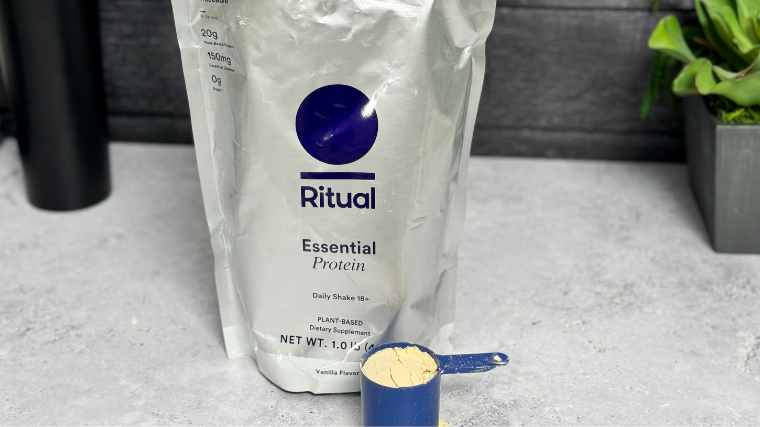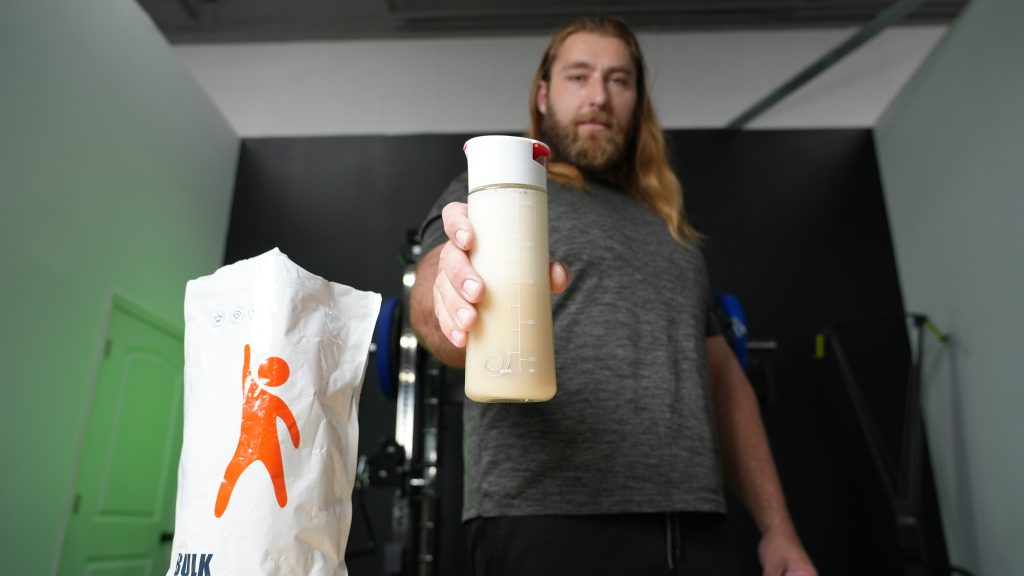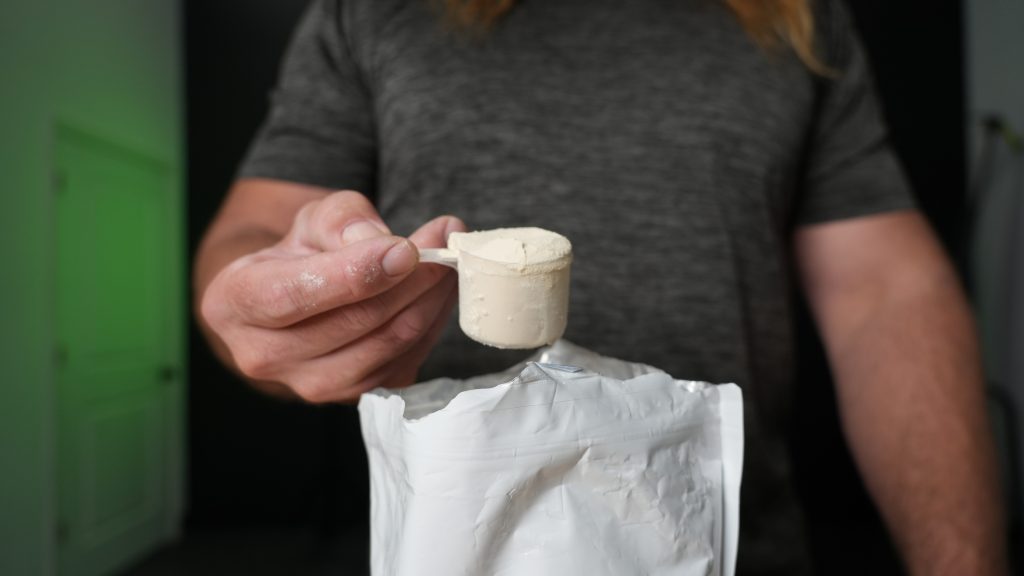Meat-eaters and plant-based folks don’t always have much in common when it comes to what’s on their plates, but one fact remains — both need protein. While it may have been challenging for vegans to meet their protein goals in the past, there are plenty of plant-based proteins on the market today. And yes, they rival even some of the best whey protein powders, too.
But a simple Google search yields hundreds of results, and combing through all those pages and ingredient lists can be exhausting. Our team of expert product testers, including personal trainers and athletes, tried more than 100 different protein supplements. We’ve gathered all the best vegan protein powders for plant-based athletes looking for muscle growth, extra probiotics, weight loss, and more.
Best Vegan Protein Powders
- Best Vegan Protein Powder Overall: Transparent Labs Organic Vegan
- Best Tasting Vegan Protein Powder: Onnit Plant-Based Protein
- Best Vegan Protein Powder for Athletes: Gainful Plant-Based Protein
- Best Vegan Protein Powder for Bodybuilding: Transparent Labs Vegan Mass Gainer
- Best Vegan Protein Powder for Weight Loss: Legion Plant+
- Best Organic Vegan Protein Powder: Ritual Daily Essential Shake 18+
- Best Unflavored Vegan Protein Powder: Bulk Supplements Soy Protein Isolate
- Best Budget Vegan Protein Powder: Orgain Organic Vegan Protein Powder
- Best Vegan Protein Powder for Probiotics: Pure Food Plant-Based Protein Powder
Editor’s note: The content on BarBend is meant to be informative in nature, but it shouldn’t take the place of advice and/or supervision from a medical professional. The opinions and articles on this site are not intended for use as diagnosis, prevention, and/or treatment of health problems. Speak with your physician or nutritionist if you have any concerns.
Best Vegan Protein Powders Video Review
Join BarBend expert tester Jake Herod, NASM-CNC, and registered dietitian nutritionist Chelsea Rae Bourgeois, MS, RDN, LD, as they compare plant-based protein powders to whey options and break down some of our vegan-friendly picks.
How We Tested and Chose the Best Vegan Protein Powders
The BarBend team is made up of competitive athletes, certified personal trainers, and lifelong fitness enthusiasts. To determine the best vegan protein powders available today, we’ve tested nearly 100 different profiles from the industry’s best brands, using our supplement testing methodology to rate each profile on a scale of 1 (lowest) to 5 (highest). Below are some of the categories and components that played into our rankings.
- Type of Protein and Texture: There are four main types of vegan protein powder: pea protein, hemp protein, brown rice protein, and soy protein. The powders on this list may come as a blend of two or more types of these powders or as a single type.
- Solubility and Texture: Solubility and texture are key with vegan protein powder, as many of these powders are grittier than whey protein. We made sure that all the powders on this list — no matter what they are derived from — have solid solubility.
- Macronutrients: Protein, fat, and carbs are considered macronutrients (macros). Many vegan protein powders tend to contain more carbs, as they are derived from plants. But most of the powders on our list provide macros similar to whey protein, which is much lower in carbs (2-9 grams) and fats (0-6 grams).
- Micronutrients: Some of the micronutrients that vegans may miss in their diet include B12, iron, iodine, zinc, calcium, vitamin D, and long-chain fatty acids such as EPA and DHA — all of which are much easier to sneak into an animal-based diet. We wanted to include protein powders that featured some of these added micronutrients as well since many vegans look to protein shakes to fill these gaps in their diet.
- Flavor: We don’t think flavor is the most important factor to consider when picking a plant-based protein but it still matters. After all, you don’t want to sip a drink that feels overly earthy or chalky. We sampled a variety of flavors (to appeal to all kinds of taste preferences) and tried our best to paint an objective picture of the taste.
- Ingredient Quality: We know that protein powders can be full of unwanted additives and ingredients. So, we prioritized clean formulas with ingredients that provide as much nutritional value as possible.
Best Vegan Protein Powder Overall: Transparent Labs Organic Vegan
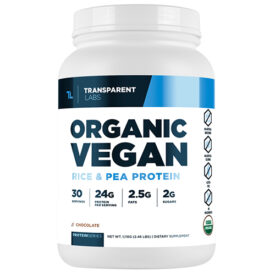
A surprisingly delicious vegan protein powder that's totally free from artificial ingredients and soy, Transparent Labs Organic Vegan Protein contains a 2:1 ratio of rice to pea protein powder, and four grams of fiber.
Specs
- Price Per Serving: $1.67
- Protein Source: Organic rice protein, organic pea protein isolate
- Protein Per Serving: 24g
- Calories Per Serving: 130-140
- Third-Party Testing: Yes (Informed Protein)
- Available Flavors: Chocolate, French Vanilla
If you’re in the market for an all-natural, organic vegan protein powder, this option from Transparent Labs is our overall top vegan protein. This non-whey protein powder uses organic rice and pea protein, helping craft a complete amino acid profile, vital for muscle protein synthesis. (13) Plus, organic pea protein isolate is high in branched-chain amino acids, which can be beneficial for post-workout recovery. (14) As such, we scored the formulation at 4 out of 5.
[Related: How Much Protein Do You Actually Need Per Day?]
In addition to the 24 grams of protein per scoop — along with between 2.5 and 3 grams of fat and between 3 and 5 grams of carbs — Chelsea Rae Bourgeois, M.S., RDN, LD appreciated the inclusion of between 3.3 and 4.3 milligrams of iron in the makeup. It also has zero artificial sweeteners or artificial flavors.
“I love that Transparent Labs keeps the ingredients list short with their Organic Vegan protein powder. You get 24 grams of high-quality, plant-based protein without any unnecessary fluff,” Bourgeois says. “Plus, you get 30% of your daily iron needs.”
As far as taste and solubility, this Transparent Labs offering gave our tester, a certified nutrition coach, a bit of a struggle. “I noticed a unique smell when mixing this powder. It’s not as if the powder has gone bad, but it’s somewhat off-putting,” they added.
Additionally, the mixed Vanilla profile tasted somewhat artificial, and the entire mixing process created a good bit of foam. We scored Organic Vegan at 2 out of 5 for taste and 3.75 for solubility, respectively.
A final note regarding this organic vegan protein powder is its reliance on stevia as a sweetening agent. Stevia can potentially lead to GI distress in sensitive stomachs, as our tester experienced after trialing this powder for some time. Be sure to take into account your own stomach limits before ordering a tub of this powder for your own routine.
Read our full Transparent Labs Organic Vegan Review.
Best-Tasting Vegan Protein Powder: Onnit Plant-Based Protein
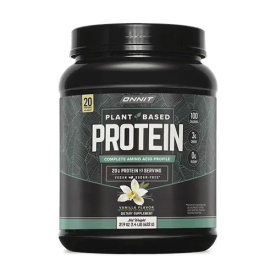
Onnit's plant-based protein powder is made of a blend of pea, pumpkin, sunflower seed, and watermelon seed proteins. This one is available in two separate flavors, too, including Chocolate and Vanilla.
Specs
- Price Per Serving: $2.25
- Protein Source: Pea protein concentrate, pumpkin seed protein powder, sunflower seed protein powder, watermelon seed protein powder
- Protein Per Serving: 20g
- Calories Per Serving: 100-110
- Third-Party Testing: Yes (Informed Sport)
- Available Flavors: Vanilla, Chocolate
Compared to protein products like whey or casein, vegan protein doesn’t always have the richest, most appetizing taste. Many have a slightly earthy flavor, considering most of the ingredients are plants. However, we didn’t have that problem with Onnit’s Plant-Based Protein.
Our tester, a certified nutrition coach, rated the taste at 4.75 out of 5, stating, “My Chocolate sample was akin to my favorite (dairy-free) chocolate milk. The taste was rich and enjoyable — a true treat when compared to other plant-based powders I’ve consumed in the past.”
[Related: Best-Tasting Protein Powders]
The formulation of this tasty vegan option is also impressive. We rated the makeup at 4 out of 5, as it blends various plant proteins for 20 grams of protein per dose. It includes a full amino acid profile rich with EAAs and BCAAs, including 2,270 milligrams of leucine — one of the most important BCAAs for muscle growth. (15)
“I did experience a slightly gritty texture, but nothing that wasn’t out of the ordinary,” our tester said, rating this powder a 4.25 out of 5 for solubility. Overall, though, there were no real issues with the powder clumping or settling.
Onnit’s Plant-Based Protein costs $2.25 per serving, which is slightly more expensive than the $1 to $2 average of other vegan supps in the category. However, Onnit does offer a subscription service that can add a 15 percent discount. /
[Related: Add These High-Protein Vegetables to Your Diet for a Muscle-Building Boost]
Best Vegan Protein Powder for Athletes: Gainful Vegan Protein
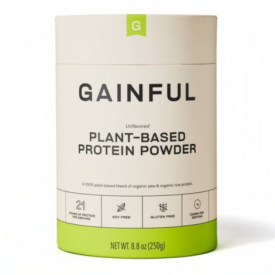
Gainful Plant-Based Protein Powder offers up to 24 grams of organic brown rice and pea protein, which delivers a complete amino acid profile.
Specs
- Price Per Serving: Starting at $3.21
- Protein Source: Organic brown rice and pea protein
- Protein Per Serving: Up to 24g
- Calories Per Serving: Around 120
- Available Flavors: Flavor boost packs available in Sea Salt Caramel, Rich Chocolate, Cinnamon Toast, Cookies and Cream, Cafe Mocha, Chocolate Peanut Butter, Strawberry Cream, and Madagascar Vanilla
One of the best parts of Gainful Vegan Protein for athletes is that the brand allows you to personalize your protein based on your needs, like if you are trying to put on muscle, lose weight, or gain weight. One thing we love for athletes is that there are up to 24 grams of organic brown rice and pea protein, which means there is a complete amino acid profile present.
“I really like that Gainful offers a personalized protein powder formula,” Chelsea Rae Bourgeois, RDN, said, giving the formulation a 4.5 out of 5. “I like that it’s unsweetened and free from artificial ingredients, too.”
We personally tested Gainful protein for both taste and solubility. One interesting aspect of Gainful compared to other vegan protein powders is that it comes unflavored, but there are a number of flavor boosters you can choose from to add to your protein.
“I am not always a fan of super sweet powders, but I really enjoyed this one. For this flavor, I definitely think you should use water instead of milk. I think closer to 8 ounces would be the ideal base to create the best taste,” our tester said, giving the flavor a 4 out of 5.
When it comes to solubility, we found mixed results, but still found Gainful to be at or above average. “I was shocked at the ease in which the shaker cup mixed the product. Within about 30 seconds, the powder was blended,” they said. They did note that using a blender will increase solubility, as a shaker cup alone left some clumps. They rated Gainful a 3 out of 5 for solubility.
Athletes should keep in mind that there are only about 120 calories per serving. That can be great for those looking to lose weight, but for those looking to gain muscle, it may be wise to mix this protein into a smoothie with additional fruit and vegetables.
Best Vegan Protein Powder for Bodybuilding: Transparent Labs Vegan Mass Gainer
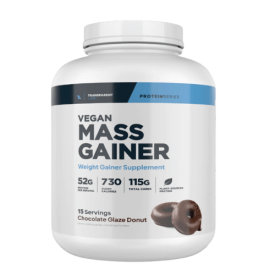
Transparent Labs Vegan Mass Gainer is ideal for athletes following a plant-based diet who also want to put on some mass. This supplement is made with a pea protein isolate and zero animal products.
Specs
- Price Per Serving: $5.33
- Protein Source: Pea protein isolate
- Protein Per Serving: 52g
- Calories Per Serving: 730
- Third-Party Testing: Yes
- Available Flavors: Chocolate Glaze Donut, Vanilla Cupcake
Plant-based bodybuilding is definitely becoming more prevalent and Transparent Labs Vegan Mass Gainer definitely makes bulking a little easier. Though this isn’t a meal replacement, this formula packs 730 calories per serving, including 52 grams of protein, 115 grams of carbs, and 10 grams of fat per serving. Thanks to the artificial-ingredient-free formula, we gave the formulation a 4.5 out of 5.
We also love that this mass gainer packs 90 percent of your daily iron needs. While you can definitely get plenty of iron from plant-based foods, it is a little trickier when avoiding meat. Luckily, this formula helps fill that potential gap in your daily diet.
Unfortunately, though, TL’s vegan mass gainer is only offered in two flavors. However, one of our testers tried out the Chocolate Glaze Donut flavor and was actually surprised by the accuracy. “After trying it a few times, I’d say it really tasted like a donut,” she said, giving the flavor a 4 out of 5.
As with most other Transparent Labs products, our testers were pretty happy with the solubility, too. The powder dissolved pretty seamlessly in our testers’ shaker cups without any noticeable clumping at the bottom.
Transparent Labs Vegan Mass Gainer is third-party lab tested, however, we do wish the brand specified by whom. We also think the price point is a little hard to swallow (pun intended). Though the $5.33 per serving price tag is pretty common for mass gainers, it’s definitely more expensive than the other protein powders on this list, earning a 2 out of 5 for cost.
Best Vegan Protein Powder for Weight Loss: Legion Plant+
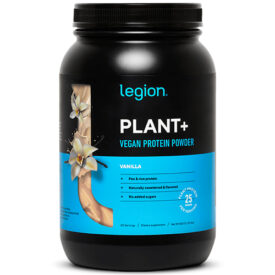
Legion's Plant+ has 25 grams of protein per serving, just four grams of carbs, and is packed with vitamins and minerals that plant-based eaters may want more of. Use code "BARBEND" for 20% off!
Specs
- Price Per Serving: $2.50
- Protein Source: Pea protein isolate, rice protein concentrate
- Protein Per Serving: 24-25g
- Calories Per Serving: 130-140
- Third-Party Testing: Yes
- Available Flavors: Apple Pie, Chocolate, Cinnamon Cereal, Mocha Cappuccino, Salted Caramel, Vanilla
For athletes with fat-loss in mind, we recommend trying Legion’s Plant+ Plant Protein Powder. The high-protein, low-carb, and low-fat split can make it easy to plan around when counting your macros or watching your calories, according to Chelsea Rae Bourgeois, M.S., RDN, LD. The maximum 140 calories per serving can be helpful for athletes looking to support their strength-gaining goals without excess weight gain.
[Related: How Much Protein Do You Need for Bodybuilding?]
While we like the macro breakdown for those following a calorie deficit, the formula does leave a little to be desired. “Legion Plant+ protein powder scores a 3.75 out of 5 for its formulation,” according to Bourgeois. “The major deductions stem from its sodium content and limited vitamin and mineral profile.”
Our testers did like the flavor variety, though. “I tried the Apple Pie flavor and it was sweeter than I expected with a little artificial taste,” our tester, a certified personal trainer, said in reference to their 4 out of 5 taste rating. “The cinnamon aspect was nice. Overall, it wasn’t bad at all but for some people, it may taste a little too sweet.”
While the presence of stevia can lead to GI distress for some, we didn’t really experience any unwanted side effects after downing our trials of Plant+. However, we understand that reactions can be highly subjective between athletes, so we conservatively rated this Legion offering at 4.5 out of 5 for side effects. This product is also processed in a facility that handles known allergens, so be sure to read the warning labels.
[Related: The Best Pre-Workout Meal for Bodybuilding Based on Your Goals]
Best Organic Vegan Protein Powder: Ritual Essential Daily Shake 18+
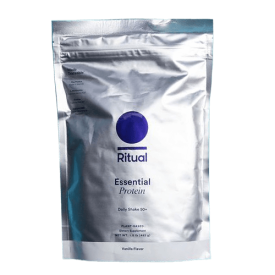
This clean, transparent protein powder relies on organic, non-GMO yellow peas for its 20-gram protein dosage. Additionally, the subscription-based model helps ensure you’re always stocked up to help you meet your nutritional goals day in and day out.
Specs
- Price Per Serving: $2.67
- Protein Source: Organic pea protein
- Protein Per Serving: 20g
- Calories Per Serving: 115
- Third-Party Testing: Yes (Informed Sport, Informed Protein)
- Available Flavors: Vanilla
For vegan athletes wanting a completely organic protein powder with an enjoyable flavor profile, Ritual’s Daily Essential Shake 18+ is one of our favorites. It features a organic pea protein to deliver 20 grams of a complete amino acid profile.
We also love that this protein is fully vetted and tested. Not only does this plant-based protein carry certifications from both Informed Protein and Informed Sport, but each ingredient is completely traceable back to its source. “I’m a huge fan of companies that are transparent with their formulas, and Ritual’s got that down to a science,” adds Chelsea Rae Bourgeois, M.S., RDN, LD.
[Related: Nutrition for Athletes — How to Eat for Muscle and Performance]
After analyzing the label, Bourgeois scored the formulation at 4.5 out of 5, thanks to its clean ingredients and complete protein makeup. She did deduce a half point for the sodium content, though.
Kate Meier, BarBend editorial member and NASM-Certified Personal Trainer, scored the solubility at 5 out of 5, too, stating, “I mixed my sample with just water and was pleasantly surprised by the smooth texture. The powder dissolved easily in my shaker bottle, and I didn’t experience any clumps or floating residue.”
This product only offers a vanilla vegan protein powder (no other flavors). However, we found this option to be tasty enough for repeated consumption, scoring it at 4 out of 5. Additionally, the vanilla flavor isn’t excessive, meaning it can be added to a smoothie or other concoction without overpowering the entire beverage.
The one major issue we have with this vegan protein option is the price per serving. At $2.67, it’s well beyond the $1 to $2 average. Add in, too, that each container only features 15 servings, and you can expect a good amount of repeat orders.
[Related: Best Clean Protein Powders]
Best Unflavored Vegan Protein Powder: Bulk Supplements Soy Protein Isolate
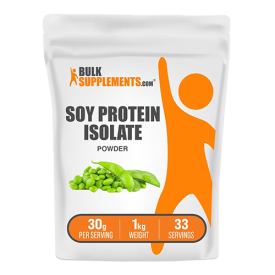
Bulk Supplements Soy Protein Isolate is made with 100 percent plant-based protein, so it's vegan-friendly. For your convenience, you can also choose from several bulk purchase options.
Specs
- Price Per Serving: Starting at $0.42
- Protein Source: Soy protein isolate
- Protein Per Serving: 25g
- Calories Per Serving: 90
- Third-Party Testing: Yes
- Available Flavors: Unflavored
It can be helpful to have an unflavored powder for smoothies or baking, as there’s less of a chance of altering your overall shake taste. This Soy Protein Isolate from Bulk Supplements is our top unflavored choice, as it can be easily added to a smoothie, shake, pre-workout, or post-workout blend without giving your palate a displeasing sensation.
Plus, each serving is only 90 calories while packing in 25 grams of the vital macronutrient (and zero grams of fat and 4 grams of carbs). Soy Protein Isolate is also a fairly clean formulation, which we rated at 4.5 out of 5, as there aren’t any added sugars, additives, dairy, or even gluten across the ingredients list. It’s simply soy protein isolate … and that’s it.
[Related: How Many Protein Shakes a Day? Here’s What You Need for Muscle Growth]
We also like this budget-friendly vegan protein powder thanks to its low cost per serving, earning a 5 out of 5 in the cost category. You can pick up this tasteless protein powder for roughly $0.42, depending on your chosen container size, which is well below the average $1 to $2 associated with other high-quality vegan protein powders in the category.
That said, though, the convenience factor is sort of lost beyond the wallet-friendly price tag. “Bulk supplements doesn’t include a scoop with this Soy Protein Isolate, so you’ll need to provide your own tablespoon to achieve optimal dosages,” says our tester, a certified personal trainer. “Also, I advise that you carefully open the bag until you’ve worked through roughly half of the powder — you could be left with some unwanted protein dust that can dirty up your counters in a hurry.”
[Related: The 5 Best Soy Protein Powders]
Best Budget Vegan Protein Powder: Orgain Organic Vegan Protein Powder
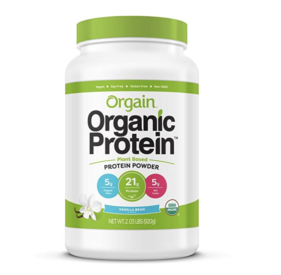
Orgain Organic Protein Plant Based Powder offers 21 grams of protein per serving, along with 5 grams of fiber and net carbs!
Specs
- Price Per Serving: Starting at $1.90
- Protein Source: Organic pea, organic brown rice, organic chia seed
- Protein Per Serving: 21g
- Calories Per Serving: 140-190
- Third-Party Testing: Yes
- Available Flavors: Creamy Chocolate Fudge, Chai Latte, Chocolate Caramel Sea Salt, Chocolate Coconut, Chocolate Peanut Butter, Churro Caramel Swirl, Cookies ’n Cream, Fruity Cereal, Horchata, Iced Coffee, Natural Unsweetened, Peanut Butter, Strawberries & Cream, Vanilla Bean, Vanilla Horchata
You don’t need to pay an arm and a leg for the best plant-based protein powders. There are still some options that rival the best whey protein powders in terms of cost, including Orgain’s Organic Vegan Protein Powder. While the price per serving is in line with the average $1 to $2 cost of other supplements in the category, this powder earns our ‘Best Budget” moniker due to its impressive subscription option that can save athletes 15 percent. Other proteins typically offer a 5-percent discount for such a service.
[Related: What to Eat After a Workout — How to Find the Right Refueling Sources]
“Orgain Plant-Based Protein is a pretty lean protein powder,” according to Chelsea Rae Bourgeois, RDN, who gave the formulation a 4.5 out of 5. “I like that it helps you boost your protein intake without significantly affecting your other macros or overall calorie intake.”
In addition to the cost-saving benefits of this Orgain offering, we also appreciate the 15 flavor options. Overall, we rated the taste at 4 out of 5 thanks to the plethora of palate-pleasing tastes offered across the lineup — there’s practically a flavor for every taste bud, which can go a long way in fighting flavor fatigue over time.
Orgain Organic Plant Based Protein Powder Ingredients
As far as the solubility, we scored this organic protein powder at 3 out of 5, due in part to its two scoops of powder per serving. No matter how you slice it, this can be an abundance of powder to try and dissolve with a shaker bottle alone. Instead, you’ll need a blender.
Read our full Orgain Organic Vegan Protein Powder Review.
Best Vegan Protein Powder for Probiotics: Pure Food Plant-Based Protein Powder
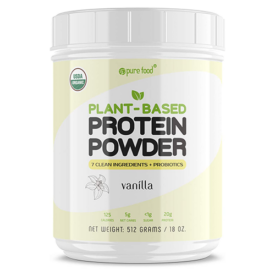
With one billion colony forming units (CFUs) of probiotics, Pure Food's vegan protein powder should be your pick for more optimal gut health. This powder also contains 20 grams of protein and four grams of BCAAs.
Specs
- Price Per Serving: $1.43
- Protein Source: Organic pea protein, organic brown rice protein
- Protein Per Serving: 10g
- Calories Per Serving: 68-70
- Third-Party Testing: Yes
- Available Flavors: Vanilla, Chocolate
Having a hearty dose of probiotics in your dairy-free protein powder can help with digestion and overall gut health in the long run. (16) While it’s not uncommon to see proteins with probiotics added to the formulation, this option from Pure Food is one of our favorites, thanks to its 1 billion colony-forming units featured in each dosage (plus, it’s a generally clean vegan protein powder, too).
We also liked the approachable price point, rating the cost a 4.5 out of 5 given its wallet-friendly $1.43 per dosage. This can be especially helpful since there is only one 32-serving container size available, meaning that repeat orders are practically a necessity if you plan to continue your supplement routine longer than 1 month.
[Related: Why Probiotics Are Extra Beneficial for Athletes]
Pure Food Plant-Based Protein Powder is also fairly lean at a maximum 70 calories per serving, which can be great for athletes focused on weight loss. However, we do wish the formulation would include a higher protein count per dosage. “You really need to mix it with other ingredients to bulk up its nutrition profile,” adds Chelsea Rae Bourgeois, M.S., RDN, LD, giving the formulation a 3.75 out of 5.
Pure Food plant-based protein in BarBend’s testing gym.
In terms of flavor variety, Pure Food keeps it simple with just two tastes to choose from — Vanilla and Chocolate. While this may dismay athletes wanting more creative options for their daily protein needs, we feel this powder can still be worthwhile, especially if you’re looking for a solution that values gut health.
Read our full Pure Food Plant-Based Protein Powder Review.
Benefits of Vegan Protein Powders
If you eat a plant-based diet, you’ll need to be extra conscious of your protein intake. Alongside boosting your protein intake, there are several benefits of vegan protein powders.
- Boosted Protein: Plant-based sources are usually lower in protein, B12, iron, and a few other vitamins and nutrients. (2) Sipping on some of the best plant protein powders can help increase some of the nutrients (like protein) you may be lacking in your daily diet.
- Added Convenience: Cooking an entire protein-heavy meal isn’t always convenient, and can be pricey. While we recommend prioritizing whole foods as much as possible, vegan protein powders can be convenient in a pinch.
How Much Protein Do You Need?
Whether you’re a vegan or meat-eater, strength athletes need sufficient protein to maintain lean muscle mass. The Recommended Dietary Allowance for the average healthy adult is 0.8 grams of protein per kilogram of body weight. However, research continues to point to higher protein needs of 1.2-1.6 g per kg of body weight when trying to improve or maintain lean muscle mass. (3)
Even a meat eater will most likely need to supplement with protein powder to meet their intake. Now, consider that most vegan protein sources pack even less protein per serving than animal protein, and a protein supplement is looking even more like a necessity. Want to know how much protein you need? Use our protein calculator below:
Protein Intake Calculator
Part of what makes a protein powder so great is the convenience factor. This is particularly helpful if you’re in a bulking phase and are sick of choking down whole foods. You can mix your protein powder of choice in some water, chug it down, and in the end, you just ingested 20 to 25 extra grams of protein.
Of course, you want to ensure you’re consuming many of your nutrients from whole foods and supplementing with the ones you may be missing.
When Should I Take Vegan Protein Powder?
One of the myths about protein powder is that you need to drink a protein shake immediately after your workout to nourish your depleted muscles, or else you’ll lose all of your gains. While it doesn’t hurt to drink a protein shake right after you exercise, it’s not necessary to retain the benefits of working out. Plus, on a vegan diet, the micronutrients included in protein powder can help fill the gaps in your diet due to your dietary restrictions at any point in the day.
As long as you are consistently consuming enough protein throughout each day, it can still help build the muscles you’re working for, no matter if it’s directly after your workout or as a late-night snack. Your daily calories and macronutrients are the primary determinants related to whether you gain muscle and lose fat, as opposed to when you eat.
How Much Do Vegan Protein Powders Cost?
If you’re just peeping at the cost of the container before deciding which protein powder is in your price range and which isn’t, you’re not actually getting a sense of how much your powder costs. You want to know how much you are paying per serving and what you’re getting in each scoop, rather than just going for the least expensive jug.
To do this, you’ll need to compare the cost of the container to the number of servings — this number tends to be around $1 to $2 per serving, depending on the brand and ingredients.
| Best Vegan Protein Powder Overall | Transparent Labs Organic Vegan | $1.67 |
| Best Organic Vegan Protein Powder | Ritual Daily Essential Shake 18+ | $2.67 |
| Best-Tasting Vegan Protein Powder | Onnit Plant-Based Protein | $2.25 |
| Best Vegan Protein Powder for Athletes | Gainful Protein Powder | $3.21 |
| Best Vegan Protein Powder for Bodybuilding | Transparent Labs Vegan Mass Gainer | $5.33 |
| Best Vegan Protein Powder for Weight Loss | Legion Plant+ | $2.50 |
| Best Unflavored Vegan Protein Powder | Bulk Supplements Soy Protein Isolate | Starting at $0.42 |
| Best Budget Vegan Protein Powder | Orgain Organic Vegan Protein Powder | Starting at $1.90 |
| Best Vegan Protein Powder for Probiotics | Pur Food Plant-Based Protein Powder | $1.43 |
The cost per serving will vary due to the type of vegan powder, additives, protein density, and more. The more natural, organic, or transparent protein powders are likely to cost a little more. In addition, added ingredients that may be good for filling gaps in the vegan diet or assisting with absorption (like micronutrients, digestive enzymes, or probiotics) can also increase the cost. The more basic the powder, generally, the less it should cost.
Different Types of Vegan Protein Powder Sources
Vegan protein powders aren’t all made from the same sources. Here’s a breakdown of the four most common vegan protein powder sources.
| Pea Protein | Hemp Protein | Brown Rice Protein | Soy Protein |
| This protein source derived from peas is one of the newer types of protein to hit the market. Its appeal is that it contains all nine essential amino acids and is considered relatively easy to digest. It’s also effective. One study showed that supplementing with pea protein while on a strength training program significantly increased biceps muscle size as effectively as whey protein. (8) | In addition to containing the nine essential amino acids, hemp protein — which is the product of ground-up hemp seeds — also has a solid dose of fiber and healthy fats. Since this type of product is high in fiber, it may help with digestion, but it may also cause gas and bloating in some. (9) | Though it’s not a complete protein, brown rice protein is derived from the protein in brown rice and is void of allergens like gluten, soy, eggs, and nuts. It also digests very quickly, especially compared to a whey product that is derived from dairy. | First, if you have a soy allergy, you’ll want to pick another option from this list. That said, for anyone else, soy protein — which is derived from soybeans — is a fine protein option. And though some may try to steer clear thinking it affects your testosterone levels, more recent studies have shown that to be largely untrue. (10) |
What to Consider Before Buying Vegan Protein Powders
When choosing which plant-based protein powder to buy, here are some important factors you should consider before making your purchase.
Protein Content
Protein content sounds like an obvious consideration, right? Of course, how much protein you need depends on your goals. For vegans, as we’ve mentioned before, getting enough complete protein in your diet can be a challenge. Athletes may need up to 1.6 grams of protein per kilogram of body weight. (3)
A less intense gymgoer who’s trying to keep their nutrition in check may want to pack added protein into their diet as well. On this list, none of the picks dipped below 20 grams of protein per serving, and some go up to 25 grams.
A Balanced Macronutrient Profile
Your caloric intake matters the most when you’re trying to gain or lose weight, but macros matter, too. There are three main macros — protein (which we’ve already covered), carbohydrates, and fat. Carbs essentially give you the energy to work out (though the carbs you don’t burn are stored as fat, so you need to balance these well). Fats generally regulate your hormones like testosterone and leptin. When it comes to carving out a more impressive physique, you want your macros dialed in.
[Related: How to Count Macros for Weight Loss, Muscle Gain, and Maintenance]
One key to managing your macro intake is choosing foods that enable a healthy macro split (depending on your goals). This way, you can better manage your overall intake and create more balanced meals.
For example, one Big Mac has 563 calories and 33 grams of fat, 44 grams of carbs, and 26 grams of protein.(4) For comparable calories, you can have a cup of rice and half a pound of chicken with spinach — a meal that packs 56 grams of protein, 46 grams of carbs, and 7.5 grams of fat.(5)(6)
Container of plant protein in testing center.
For this reason, we chose vegan protein shakes that had minimal grams of carbs and fat to ensure you were getting mainly protein.
Vitamins and Nutrients that Vegans Need
There are specific vitamins and nutrients in meat that vegans might not be getting enough of. To recap, those are B12, iron, iodine, zinc, calcium, vitamin D, and long-chain fatty acids such as EPA and DHA.
[Related: 7 Micronutrients That Are Important for Athletes]
For example, vitamin B12 is an essential nutrient that isn’t made by plants, and research shows there is a high rate of deficiency in vegan and vegetarian populations. (7) The protein powders on this list contain most of the recommended nutrients and vitamins that plant-based eaters want.
Final Word
Vegan protein powders and plant-based protein options, in general, have come a long way in recent years. There used to be only a few options, and they were rather expensive compared to milk-derived protein — and we don’t even need to mention the gritty, sand-like texture. Those days are long gone, with nearly every major supplement company now producing a plant-based or vegan protein option.
Any strength athlete will need more protein compared to folks who don’t train. And if you’re a plant-based eater, then you’ll need to choose your protein with more careful consideration. For one, you want to ensure it fits your dietary restrictions, and two, you want to make sure the powder you choose contains the proper amount of protein, vitamins, and minerals to fill the gaps in your vegan diet. Review this list of the best vegan protein powders carefully, make your selection, and then get to training.
FAQs
Is vegan protein powder just as good as whey?
A high-quality vegan protein powder can be just as effective as whey. Though good vegan powders are more difficult to find, a pea protein powder or pea protein blend provides the same muscle-building benefits as whey, and in some cases, similar macros as well.
What is the best vegan protein powder?
Vegan protein powders used to be difficult to find. Nowadays, most supplement companies have a vegan option, and there are a lot of choices. Our favorite one at the moment is KOS Organic Plant Protein. It delivers 20 grams of protein, and provides a variety of micronutrients that may be beneficial for those on a more limited vegan diet. KOS also priced it well when you consider the high quality of the all-natural and organic formula.
Is vegan protein powder healthy?
A vegan, lactose-free protein powder can certainly be healthy, depending on the product you choose. Prioritize options that are low in artificial ingredients or sweeteners.
Does vegan protein powder mix well?
Since vegan protein is derived from plants and plants contain more fiber, some blends can be grittier than animal-based whey proteins. However, the difference is not significant, especially if you blend vegan powder into a smoothie or shake that contains plant-based milk and/or other ingredients.
Do I need a vegan protein powder to complement my diet?
It’s possible for vegans to have nutritional gaps in their diet, and since vegan protein powders often include a lot of these vitamins and minerals (as well as protein), they can be a great option for anyone looking to fill vegan dietary gaps.
References
- Akhlaghi M. The role of dietary fibers in regulating appetite, an overview of mechanisms and weight consequences. Crit Rev Food Sci Nutr. Published online October 4, 2022. doi:10.1080/10408398.2022.2130160
- Rogerson D. Vegan diets: practical advice for athletes and exercisers. J Int Soc Sports Nutr. 2017;14:36. Published 2017 Sep 13. doi:10.1186/s12970-017-0192-9
- Nunes EA, Colenso-Semple L, McKellar SR, et al. Systematic review and meta-analysis of protein intake to support muscle mass and function in healthy adults. J Cachexia Sarcopenia Muscle. 2022;13(2):795-810. doi:10.1002/jcsm.12922
- FoodData Central. McDonald’s Big Mac.
- FoodData Central. Cooked Brown Rice.
- FoodData Central. Chicken Breast.
- Niklewicz A, Smith AD, Smith A, et al. The importance of vitamin B12 for individuals choosing plant-based diets. Eur J Nutr. 2023;62(3):1551-1559. doi:10.1007/s00394-022-03025-4
- Babault N, Païzis C, Deley G, Guérin-Deremaux L, Saniez MH, Lefranc-Millot C, Allaert FA. Pea proteins oral supplementation promotes muscle thickness gains during resistance training: a double-blind, randomized, Placebo-controlled clinical trial vs. Whey protein. J Int Soc Sports Nutr. 2015 Jan 21;12(1):3. doi: 10.1186/s12970-014-0064-5. PMID: 25628520; PMCID: PMC4307635.
- El-Sohaimy SA, Androsova NV, Toshev AD, El Enshasy HA. Nutritional Quality, Chemical, and Functional Characteristics of Hemp (Cannabis sativa ssp. sativa) Protein Isolate. Plants (Basel). 2022;11(21):2825. Published 2022 Oct 24. doi:10.3390/plants11212825
- Reed KE, Camargo J, Hamilton-Reeves J, Kurzer M, Messina M. Neither soy nor isoflavone intake affects male reproductive hormones: An expanded and updated meta-analysis of clinical studies. Reprod Toxicol. 2021;100:60-67. doi:10.1016/j.reprotox.2020.12.019
